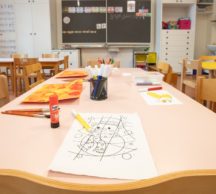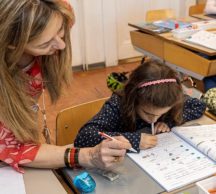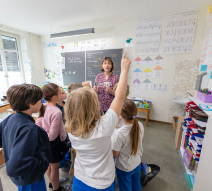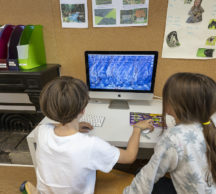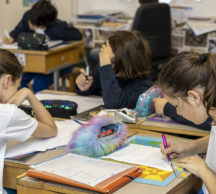Second-year primary class
In their second year of primary education, the child develops: Their reasoning and deftness of mind. Their desire to learn and receive training. Their passion for meticulous, in-depth work. Their means of communicating in speech and writing. Their independence and sense of responsibilities.
The program in detail
- Reading – decoding
- Literature – comprehension
- Langage
- Handwriting
- Mathematics - Numbers
- English
- Singing and poetry
- Arts
- Awareness
- Rhythm
Reading – decoding
- Identifying a sound made at the start, in the middle and at the end of a word
- Learning the most-often used consonants and vowels, as well as the sounds ‘ch’ and ‘ou’, according to the gestural and phonetic method created by Suzanne Borel-Maisonny
- Exercises in syllabification
- Reading simple words and possibly short sentences
Literature – comprehension
- Activities in reading different illustrated books using the SWR (Say-Write-Read) approach
- Working on understanding stories
- Living out life experiences (mirroring)
- Identifying features like a title, an author’s name and a cover
- Being capable of recounting a lived experience or a known story
- Studying culture and gaining knowledge of cultural heritage
- Studying an author’s world
- Studying the different narrative networks
- Becoming acquainted with emblematic figures
- Widening vocabulary
Langage
- Enriching language and free expression through stories invented and accounts of events experienced or stories told
- Memorising and reciting poems
Handwriting
- Exercises in flexing the hand and arm in space, on a slate and then on pre-writing worksheets
- Learning the letters of the alphabet in lower-case cursive handwriting
- Writing the child’s surname and first name in joined-up letters, writing simple words and sentences
Mathematics - Numbers
- Studying numbers 1 to 9; learning the symbols ‘more than’, ‘less than’ and ‘equal to’
- Simple subtractions and additions
- Mathematical games developing skills in observation, reflection and strategy, and covering the following topics: closed and open lines, oriented trajectories, inside and outside, tessellation, moving grid patterns, symmetry, measurements, ordered sets and complementarity, and recognition of geometric shapes (circles, squares, rectangles, ovals, rhombuses)
- Dice dot patterns
English
- Learning English using the ‘Hippo and Friends’ method from Cambridge University Press
- Pupils are encouraged to develop their motivation, understanding and participation as much as possible through a wide range of stimulating activities such as songs, stories, poems and games
- Topics covered: numbers one to ten, colours, animal names, clothes and food
Lessons are given in half-groups by a specialist teacher who is a native English-speaker.
Singing and poetry
- Memorising, singing and reciting a variety of songs and poems relating to the seasons, different class activities, festivals, etc.
- Mastering the voice, rhythm and tones
Arts
- Developing creativity through use of different materials and techniques
- Developing fine psychomotor skills (cutting, stitching, colouring, painting, etc.)
- Creating items in relation to seasons and festivals
- Illustrating stories, songs and poems
Awareness
- Different topics throughout the year: awareness of nature, observing animals, awakening the senses, learning about life in society and an annual theme chosen by the school.
Rhythm
Pupils feel what they hear through the bodily interpretation of sounds and rhythms played by the teacher.
Stimulating their motor skills helps them use their body as their first instrument.
- Development of a musical ear
- Exercises in mobility, coordination, balance with or without music, and in creating short choreographic sequences
Weekly lessons given by a teacher from Institut Jaques-Dalcroze.
Toutes les informations pour procéder aux démarches d’admission sont disponibles en ligne :
Admissions